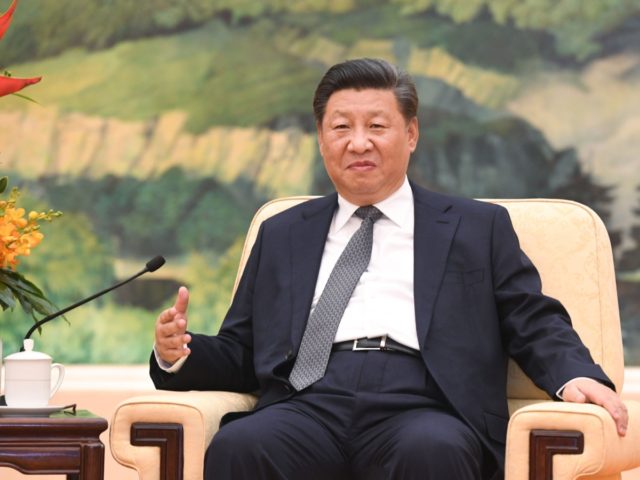Chinese dictator Xi Jinping delivered comments on Tuesday again offering no leadership on the historic floods threatening at least 27 provinces in the country, instead pressuring Chinese businesses to rapidly make up for losses caused by the Chinese coronavirus pandemic.
Over a month of consistent heavy rain has resulted in hundreds of rivers in the Chinese heartland flooding, particularly the Yangtze – the longest river in Asia spanning nearly 4,000 miles. The flooding has raised international concern over the security of the Three Gorges Dam, China’s premier infrastructure achievement, now believed to have been “distorted” by water pressure. Chinese officials have blown up at least one other minor dam to protect Three Gorges.
The summary of Xi’s remarks Tuesday published by state news agency Xinhua does not indicate that Xi mentioned the floods at all, despite the fact that they are affecting key economic centers in the country like the Wuhan metropolitan area (the Yangtze flows through the heart of Wuhan). Xi instead urged “entrepreneurs” to be more aggressive in competing internationally.
“Through joint efforts of the whole nation, China has achieved significant strategic results in epidemic prevention and control, while its economy reported stable performance with signs of improvements,” Xi said at the event, identified as a “symposium” on entrepreneurship in the communist country.
“Xi called for efforts to boost confidence and rise to challenges, amid endeavors to make up for the losses caused by the epidemic and strive for good results in economic development throughout the year,” Xinhua reported. “In the face of an external environment characterized by rising protectionism, global economic downturn, and a shrinking international market, Xi stressed the need to pool resources and concentrate on managing the country’s affairs well.”
Xi reportedly did not list overwhelming natural disaster as one of the national “affairs” that need managing. He did emphasize the need for China to “speed up breakthroughs in core technologies,” a concern for American officials given the growing wave of cases against Chinese citizens and affiliates in America for stealing American intellectual property.
“We shall stand on the correct side of history, stick to deepening reforms and opening up, step up opening up and cooperation in the sci-tech field, advance the development of an open world economy, and promote the building of a community with a shared future for mankind,” Xi reportedly concluded.
The People’s Daily, the official newspaper of the Communist Party of China, noted in its report on Xi’s speech that among those in attendance were representatives of foreign companies like Microsoft and Panasonic, listening to Xi’s message of boosting Chinese influence in the global economy.
Xi’s remarks follow months of attempts by the Communist Party to present a face of economic stability to the world in the aftermath of the peak of the Chinese coronavirus pandemic in the country. Doctors are believed to have first detected the virus, previously unseen in humans, in the central city of Wuhan, among the most devastated by the floods, late last year. Xi’s regime locked the city of 11 million down – in some cases, welding families shut in their homes – for over a month in the first half of the year while claiming to have the outbreak under control there. In March, Xi Jinping finally made a personal appearance in Wuhan to declare that the outbreak was over. Shortly thereafter, he announced a plan for China to expand its control of global pharmaceutical development in the aftermath of the pandemic.
“We need to better coordinate financial regulation to keep global financial markets stable. We need to jointly keep the global industrial and supply chains stable,” Xi said at the time. “What China will do in this regard is to increase its supply of active pharmaceutical ingredients, daily necessities, and anti-epidemic and other supplies to the international market.”
While providing commentary often on China’s role in the international economy, Xi has been relatively mum on the natural disaster consuming much of his country. In the face of large-scale evacuations out of Hubei province, whose capital is Wuhan, Xi made some remarks last week on the floods, urging local officials to “brave challenges” but offering little policy insight on how to do so.
“Chinese President Xi Jinping has called for the greatest efforts to brave challenges and go to the frontline of flood prevention and rescue and relief work to ensure the safety of people’s lives and property,” Xinhua reported at the time. “Authorities should take more effective flood control measures and do solid work in monitoring and early warning, safety hazards checking at dikes and reservoirs, emergency response and resettlement of the affected people, Xi said.”
At the time of Xi’s remarks last week, local officials had issued flood alerts for 433 rivers.
Since then, record rainfall has resulted in reports that the Three Gorges Dam, a hydroelectric plant, has “moved, leaked, and distorted” as a result of the floodwaters – despite dramatic action to alleviate the pressure like blowing up at least one dam elsewhere. Footage of water flowing violently through the dam, allegedly an attempt to relieve pressure on it, has alarmed many living in the area, though it has received minimal coverage in the Western world.
While the Yangtze, based on its sheer size, is the greatest cause of concern, many of the hundreds of other rivers have caused alarm. The Huaihe River, for example, passes through four provinces and has trapped thousands in cities on its banks.
The floods have killed an estimated 200 people and displaced about million others. Xinhua claims nearly 4 million people have been “affected” by the floods, without specifying how it defines that term.
State media outlets have asserted that the situation is under control thanks to local officials, admitting that “over 2,500 flood-related risks have occurred” in five provinces as of Wednesday.

COMMENTS
Please let us know if you're having issues with commenting.